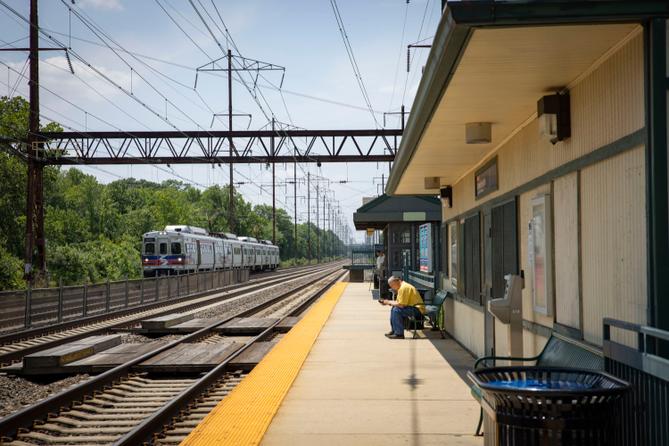HARRISBURG — The Shapiro administration will allow SEPTA to use hundreds of millions of dollars set aside for critical repairs and maintenance to fund court-ordered service restorations.
The move resolves the key stumbling block in negotiations over the more than two-month-late state budget, but doesn’t give SEPTA and other struggling transit agencies the stable revenue they and legislative Democrats have been desperately seeking.
In a statement, Gov. Josh Shapiro’s office said that approving SEPTA to use up to $394 million in capital funds for its daily operations would preserve existing service and avoid planned service cuts for the next two years.
These capital dollars from the Public Transportation Trust Fund (PTTF) pay for long-term projects and equipment, like new trolleys and trains
The administration also said that as a condition of approving the request, SEPTA had been instructed “to continue to address its structural challenges and report to PennDOT every 120 days the steps taken and progress made to increase efficiencies within the system.”
The statement also said Shapiro would continue advocating for a “long-term, recurring funding solution.”
The fund transfer does not require approval from state lawmakers, including Republicans who control the Senate.
SEPTA’s request to transfer the capital funds came shortly after a court ruling that will force the agency to reverse the major service cuts to bus and metro lines that it enacted last month, after additional state funding was not forthcoming.
On Friday, Scott Sauer, general manager of SEPTA, sent a letter to Pennsylvania Department of Transportation Secretary Michael Carroll, in which he asked for approval to use the $394 million for daily operations.
“It was our hope that the Legislature could come to an agreement and pass into law Governor Shapiro’s plan to increase recurring revenue and fund a long-term solution for SEPTA,” Sauer wrote in the letter obtained by Spotlight PA. “We are thankful to the Governor and the entire Shapiro Administration for staying at the table and fighting for SEPTA's riders and employees; however, given the legislative delay and increasing fiscal pressures, we are faced with no other option than to request this waiver.”
Agency spokesperson Andrew Busch noted that SEPTA still plans to enact a fare increase, which is scheduled to take effect on Sept. 14.
He said service restorations to bus and metro lines will also happen the same day.
“This is not the ideal outcome we wanted; however, it prevents SEPTA from having to raid current capital dollars and does not halt any already-underway projects,” Busch said in an email.
SEPTA’s funding request also came at a time when state budget talks related to transit appeared to have ground to a halt.
For weeks, Republicans have endorsed a plan to tap the special transit fund that pays for capital projects to help fund agencies’ operations. They also wanted to use the money for road and bridge work. And they repeatedly called SEPTA’s financial complaints — and the steep service cuts the agency has enacted — a “manufactured crisis.”
Democrats had resisted the plan, saying that SEPTA and other transit agencies need new, recurring revenue to be truly stable. Transit agencies around the country have suffered financially after pandemic-induced declines in ridership and the subsequent sunsetting of federal stimulus dollars.
Shapiro and other Democrats also opposed the Republicans’ pitch to use transit money for roads and bridges.
Recently, Shapiro and other top Democrats had expressed a willingness to pull money from the special fund as part of a broader package. However, state Senate Appropriations Committee Chair Scott Martin (R., Lancaster) said in an interview that his caucus had fundamental differences with Democrats.
“I’m not a fan of a long-term solution,” Martin said of SEPTA funding in a recent TV interview.
He’s not convinced, he said, that SEPTA is committed to working on reforms Republicans think are important, like cutting down on fare evasion, and said this is making his caucus reluctant to commit dollars to transit funding year over year.
“Show us that you’re serious about what you said you were going to do, and then we’ll have the conversation about the long-term funding,” he said. “That’s the huge philosophical difference that’s going on right now.”
After news of the funding transfer request broke last week, state Senate Majority Leader Joe Pittman (R., Indiana) said in a statement that his caucus supports the move, again calling SEPTA’s service cuts a “manufactured crisis” and saying the Senate would continue to push for “safety and accountability reforms” for transit.
In an email to fellow Senate Democrats last week, the chamber’s minority leader, Jay Costa (D., Allegheny) wrote, “It has unfortunately become clear that the Senate Republicans do not wish to negotiate in good faith toward a resolution.”
A spokesperson for state House Democrats echoed that in a statement.
“House Democrats, along with the Governor’s office and the Senate Democrats, have done our absolute best to meet the concerns expressed by the Senate Republicans regarding the need for road and bridge funding, reforms, accountability, safety, and so much more — and still the Senate Republicans say ‘no,’” spokesperson Elizabeth Rementer said.
Rementer said there’s still a need for “real, stable, recurring revenue to support transit across the commonwealth.
“As this crisis becomes more acute in all 67 counties, we still demand Senate Republicans live up to their claims and finally fund transit.”
In his email to state Senate Democrats, Costa also shed more light on SEPTA’s request to transfer capital funds.
He framed it as “the governor, PennDOT, SEPTA, and [Pittsburgh Regional Transit]” having “one more tool they can use to get through the next fiscal year and restore services.”
“We believe based on several factors we must pivot,” Costa said of the decision to embrace a funding approach that had, until now, been mostly championed by Republicans.
